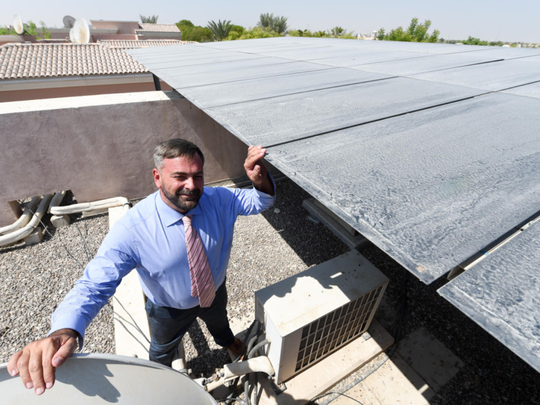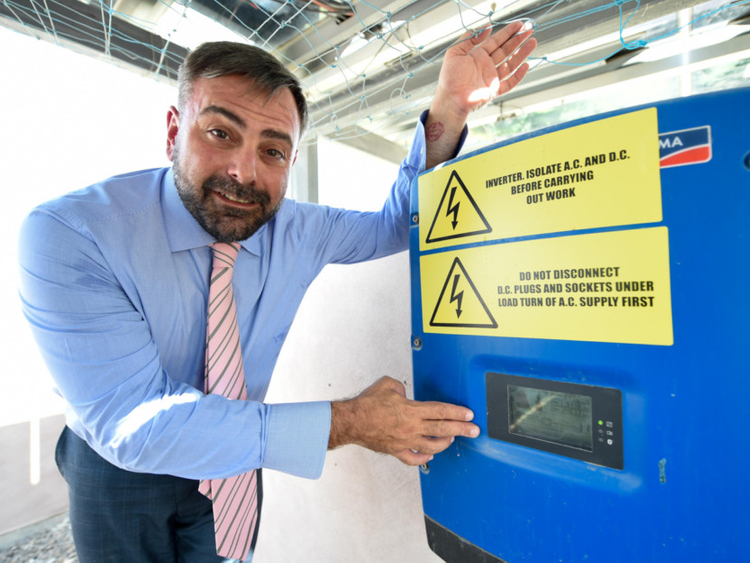
Dubai: Imagine having zero electric bills in winter and paying the equivalent of just 20 per cent of your neighbour’s utility bills the rest of the year.
Yes, this is in Dubai.
As the second Dubai Solar Show begins on Monday, Gulf News will look at this smart home of Ivano Ianelli’s in Arabian Ranches to see the benefits he’s been reaping over the years.
- Ivano Ianelli | Home owner, Arabian Ranches
The Dubai Carbon Centre of Excellence CEO converted his home into a smart home in 2011 — one where all its electronic devices are connected in a special structured wiring to allow occupants to remotely monitor, control or program them by entering a single command.
“When I did this, I wasn’t looking at the economic benefits. That is something that came later on. What I was looking for was comfort. I really wanted to have a simplified, more personalised living environment,” Ianelli told Gulf News during a visit.
That practical decision meant everything is connected together and his house became energy and water efficient. The sensors installed in the villa tracks occupants in the room and automatically switches off lights and sets the AC from 24C to 28C and vice versa depending on whether the room is being used.
“Why is this so important? Because I travel a lot. So if I’ve left an air-condition running, even if I can afford to leave it running for a week, it’s a waste of resources. Again, it saves me energy and it makes my life easier.”
By 2014, Ianelli made his house’s efficiency a notch higher. He installed 5.28kW solar panels in September that year at a cost of around Dh25,000. Back then, finding contractors and suppliers and even information on solar rooftop panels was hard to come by.
Ianelli worked with Dubai Electricity and Water Authority (Dewa) and his experience in getting rooftop solar was taken into account in helping shape the framework and practical application of the Shams Dubai, an initiative launched in 2015 to regulate the generation of solar energy for houses and buildings across Dubai.
From 2014 onwards, positive results kept pouring in for Ianelli. His chillers worked more efficiently because the solar panels provided shading. His power consumption decreased making his usage drop two slab tariffs from red to yellow.
In Dubai, the more energy you use, the more expensive the tariff for that slab is. So from being an energy intensive household paying 38 fils in the red slab, Ianelli dropped to yellow paying just 28 fils per kWh.
“Essentially, from the shading alone I receive 18 to 20 per cent more efficiency on the chillers. And the AC is about 70 per cent of the consumption. Then during the winter months when there is almost no AC, the house is completely powered by solar and generates a surplus which is fed to the grid that I receive later on,” he explained.
Based on the detailed report of the solar system on his rooftop, Ianelli’s actual energy production was 30 per cent better than expected. It has so far produced 25 megawatts since 2014.
And the best part is, Ianelli said, he managed to break even in just three years last month (September 1), two years earlier than expected.
Money-wise, it is also a good deal, he said.
“To illustrate, I’m paying 20 per cent of what my neighbours’ bills are, so I’m saving 80 per cent. My average bill per year is about Dh24,000. My neighbour’s is roughly Dh60,000 to Dh80,000. So it’s a very substantial savings from combining solar with energy and water efficiency.”
Ianelli has since offered the villa for rent and these savings — in terms of money and carbon emissions — made the villa appealing for Anthony Jack Terrini.
“That’s the main reason I chose to rent this villa. I spend Dh6,000 a month on utilities. With the system installed here, I am not only saving money, I can also teach my kids about saving the environment,” Terrini said.
“I will be so stupid to not choose this villa. I will get Dh40,000 savings from utilities a year, and since I am renting it for three years, I will save Dh120,000 in electricity and water for three years. This is money right away. I will be one of the proudest people in Dubai knowing that I am living in a villa where I am helping to save the environment.”
Ianelli said everyone can harness these benefits as well because the technology is already mature and the process has already been simplified.
“The only reason people are not switching is because they cannot be bothered to do the research. Let’s stop being lazy It’s silly to burn money because why should I waste money and resources? Resources are finite; our demands are infinite. And again, whatever we can save today, it will come useful tomorrow,” Ianelli said.
In numbers
Space covered: around 36 square metres
Panel type: Thin film, black glass PV panel at 120 watt each
Total expense: Dh25,000 (If he installed the same system now, it would be 20 to 30 per cent less)













